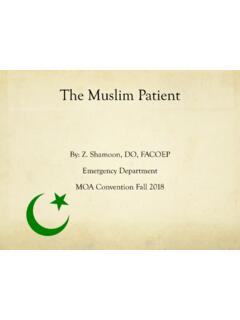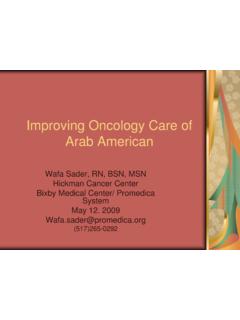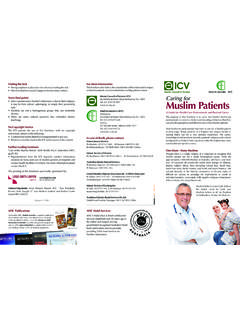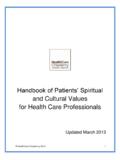Transcription of Palliative Care for Muslim Patients - prolifemuslims.com
1 JOURNAL OF SUPPORTIVE ONCOLOGYJ Support Oncol 2005;3:432 436 2005 Elsevier Inc. All rights O W W E D O I Tor Hell based on their lawful or unlawful deeds, AND HEALTH ISSUESThe Islamic teachings encourage Muslims to seek treatment when they fall sick. The Prophet (pbuh) said Seek treatment, because Allah did not send down a sickness but has sent down a medication for it known to those who know it and not known to others except for death. 6 In terms of treatment options, Muslim Patients re-sort to modern medicine, spiritual healing, and traditional healing practices. The spiritual heal-ing practices include recitation of verses of the Noble Qur an and specific Prophetic The use of Zamzam water, obtained from the well in the Holy Mosque, located in Makkah, Saudi Arabia, is also widely Although forbidden according to the Sunnah, the use of amulets is still not uncommon among some Mus-lim According to Islamic teach-ings, honey and black cumin (Nigella seeds) are considered to have healing Cauteriz-ing is still practiced as a traditional healing mea-sure by some Muslim Patients despite the fact that it was not particularly recommended by the Prophet (pbuh).
2 6 THE MEANING OF SUFFERING IN ISLAMM uslims believe in divine predestination and attribute the occurrence of pleasure and suffering to the will of Allah. They generally perceive suf-fering as a way of atonement for one s sins, as the Prophet (pbuh) said, No fatigue, no disease, nor sorrow, nor sadness, nor hurt, nor distress befalls a Muslim , even if it were the prick he receives from a thorn, but Allah expiates some of his sins for that. 8 This interpretation helps Patients and families to cope with serious and life-limiting ill-nesses. However, it does not belittle the fact that every effort should be made to relieve suffering. Islamic teachings consider the relief of suffering of man and animal to be highly , 8 Manuscript received April 12, 2005; accepted July 7, to: Mohammad Z. Al-Shahri, MD, Box 365636, Riyadh 11393, Saudi Arabia; fax: +966-1-4654277 e-mail: al-Shahri is a Consultant, Palliative care Medicine, King Faisal Cancer Center, King Faisal Specialist Hospital and Research Center, Riyadh, Saudi Arabia.
3 Dr. al-Khenaizan is a Consultant, Family Medicine Department, King Faisal Specialist Hospital and Research Center, Riyadh, Saudi Arabia. Palliative care for Muslim PatientsMohammad Zafir al-Shahri, MD, and Abdullah al-Khenaizan, MDS piritual care is recognized as an inte-gral component of comprehensive pal-liative ,2 Muslims, estimated to number to billion worldwide,3,4 regard Islam as both a belief system and a way of life, as per the teachings of the Qur Therefore, delivery of quality healthcare to Muslim Patients calls for promoting health pro-fessionals awareness of the religion of Islam. In this paper, the authors aim at discussing some of the religious aspects pertinent to caring for a special group of Muslim Patients , namely the terminally ill. This discussion should not be considered stereotypically applicable to every terminally ill Muslim patient, as every patient is unique.
4 Indeed, not only do the schools of thought vary, but also the level of observance may vary considerably among Patients within the same school of Religion of IslamThe Arabic word Islam means total submis-sion to the will of Allah (the creator of the uni-verse) by conforming inwardly and outwardly to His law. The religion of Islam is based on five pillars (Table 1). In the Islamic doctrine, the Noble Qur an is the Holy Book revealed to the last messenger, Muhammad, peace be upon him (pbuh). The sayings, deeds, and sanctions of the Prophet (pbuh) are collectively known as the Sunnah. The Noble Qur an and the Sunnah are the two main sources of the Islamic teachings and laws. Muslims believe in all other proph-ets, including Noah, Abraham, Moses, and Je-sus, peace be upon them all. They also believe in the hereafter, where final judgment will take place and people will be adjudicated to Heaven 433 VOLUME 3, NUMBER 6 NOVEMBER/DECEMBER with any of these substances will render the patient ritu-ally unclean and, therefore, unable to perform prayers.
5 The patient is exempted from this requirement only when it be-comes very difficult to fulfill. The ritual washing of the face, forearms, and feet, known as Wudu, is a prerequisite for per-forming prayers. For Patients who cannot perform ritual wash-ing before prayers, it is permissible to perform Tayammum, which involves touching clean sand with both palms and gen-tly sweeping them over the face and back of the hands. Pre-packed sterilized Tayammum sets are commercially produced but not yet widely available. Families can be encouraged to bring in materials from home if not medically contraindicated. Friday is the usual day when Muslims will want to take a ritual bath (Ghusl). For both males and females, Ghusl is mandatory following sexual intercourse. Females need to perform Ghusl at the end of their menstrual cycle as well. Awareness of these practices should help healthcare providers understand why a patient would ask for help to take a bath shortly after having had one.
6 Patients with malignancies complicated by chronic fecal, urinary, bloody, or gynecologic discharge are required to perform Wudu prior to each prayer in its designated , Muslim Patients should have a healthcare provider of the same sex. However, when this becomes difficult, pa-tients are allowed to be cared for by professionals from the opposite sex. Whenever a male healthcare provider cares for a female patient, he should always be joined by a female staff member or have the patient attended by one of her adult rela-tives. Exposure of the patient s body parts should be limited to the minimum necessary, and permission should be asked before gently uncovering any part of the body. Even more care should be taken when exposing private parts, and attempts should be made to avoid such exposures unless absolutely nec-essary. It is not uncommon for a Muslim patient to decline shaking hands with a health professional of the opposite sex; caution should be practiced to avoid unnecessary Avoidance of eye contact between a female patient and a male healthcare provider should not be misinterpreted as lack of trust or a sign of rejection but rather as a common sign of modesty in this patient population.
7 According to the Islamic teachings, gaining permission from inhabitants is re-quired before coming into their Thus, Patients would appreciate it if some sort of notice was given before entering their rooms in a health ASPECTSIt is unusual for Muslim spouses to display affection before strangers, an observation that might be misinterpreted by some healthcare professionals as a sign of a dysfunctional fam-ily. Islamic teachings encourage the community to visit the sick and also the sick to welcome Patients , therefore, may get many visitors during hospitalization. The number of visitors can sometimes exceed what the available space can accommodate. The healthcare providers are encouraged to ISLAM AND MEDICAL ETHICSThe ethical principles regulating healthcare for Muslim Patients include the four widely recognized basic concepts of medical ethics: nonmaleficence, justice, autonomy, and Of them, one concept or another may predomi-nate according to different clinical scenarios.
8 However, gen-erally speaking, the concept of nonmaleficence and justice take precedence, since the avoidance of inflicting harm takes priority over doing good (primum non nocere) and the relief of one patient s suffering should not cause another to experience an equal or greater suffering. In concept, mentally competent adults of both genders are granted the full right to accept or refuse a medical In reality, however, close fami-ly members often contribute significantly to the decision-mak-ing process. Power relations in Muslim families vary from one family to another. Generally, the parents, spouses, and elder children, in descending order, have greater decision-making power than the rest of the teachings give mentally competent adult Patients the full right to refuse current or future treatment. This right does not hold when treatment is considered mandatory as per Islamic rules, such as in the case of serious, treatable, commu-nicable disease.
9 Many medical ethicists and Muslim scholars consider it equally appropriate to withhold or withdraw futile medical treatment, because all commissions and omissions of medical treatment are seen as active or passive interventions, Other Muslim scholars tend to be stricter about withdrawing rather than withholding treatment, even when both are considered medically This outlook may be attributed partly to the relative emotional ease of treatment withholding as opposed to withdrawal. However, this view may also be explained by reference to the Islamic jurisprudence principle certainty cannot be overridden by uncertainty, as it is certain (100% probability) that withdrawing a treatment will deprive the patient from any potential benefit associated with it, whereas it is uncertain (less than 100% probability) that maintaining that particular treatment will cause clothes and body of the patient must be free from any amount of urine, stool, vomit, or blood if at all possible.
10 Soil-Table 1 The Pillars of IslamShahadah Bearing witness that there is no one who deserves to be worshipped save Allah and that Muhammad (pbuh) is the messenger of AllahSalah Five daily prayersZakah AlmsgivingSawm Abstinence from food, drink, and sexual intercourse during daytime throughout the ninth lunar month (Ramadan)Hajj Pilgrimage to Makkah once in lifetime by those who are financially and physically ableal-Shahri and JOURNAL OF SUPPORTIVE ONCOLOGY express a high degree of sensitivity if it becomes necessary to interfere in such mandatory five daily prayers must be performed dur-ing health and sickness except when a patient is cognitively unable. When the patient regains consciousness and lucid-ity, compensation for the lost prayers is usually needed. The prayers, however, can be combined in a way that allows the patient to pray three times instead of five times per day.









